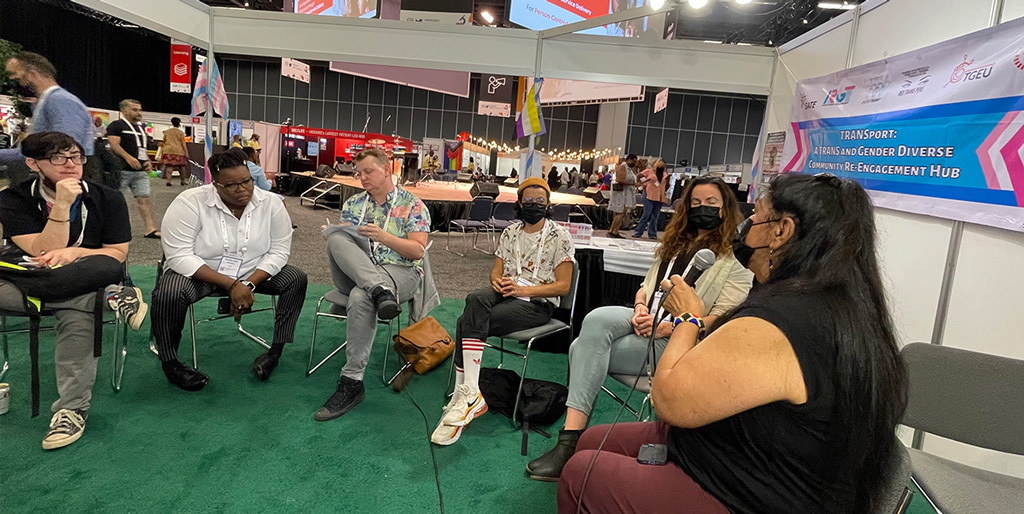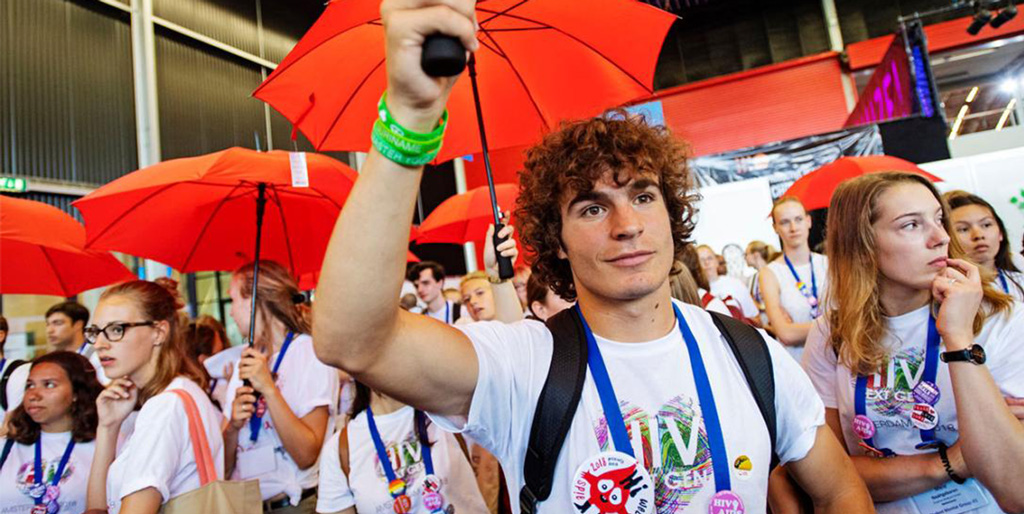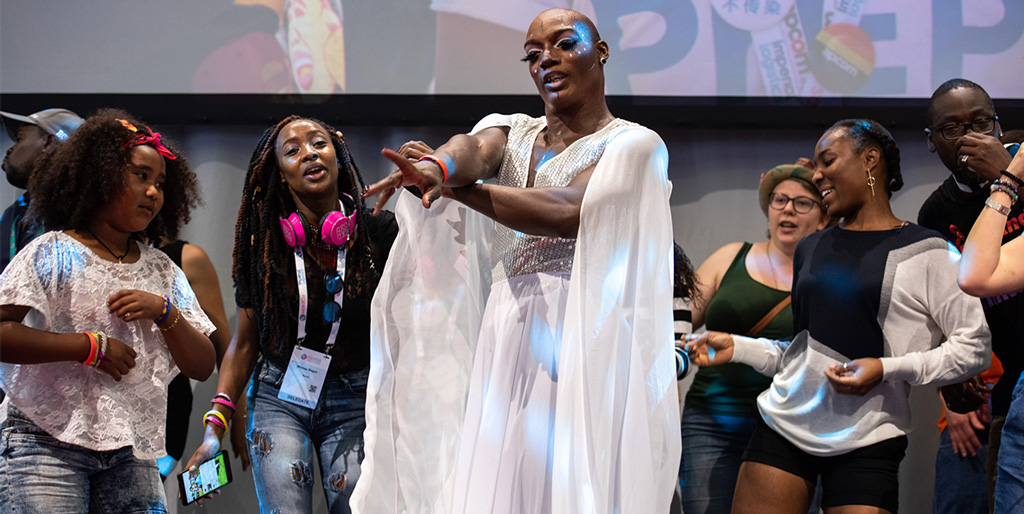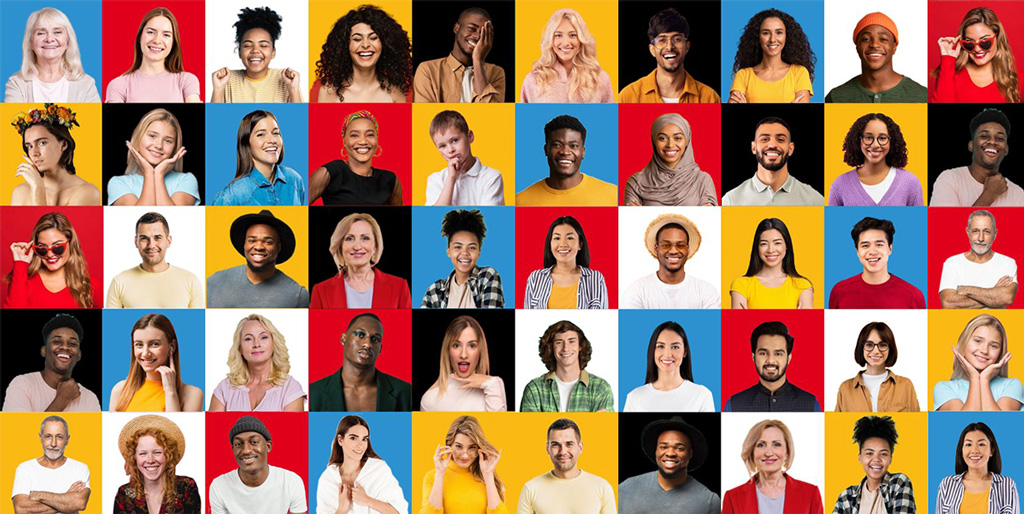Ahead of of the International AIDS Conference – AIDS 2024, as part of the regional #PutPeopleFirst campaign, VirusOFF meets with leading experts from the Eastern Europe and Central Asia (EECA) region to discuss key aspects where health and human rights come to the fore. These issues not only have a significant impact on the lives of people living with HIV, but also determine the effectiveness of public health policies and programs in the region.
Walls are not the answer. #PutPeopleFirst!
You can learn more about the EECA region and AIDS 2024 at aids2024.virusoff.info and our social networks.
Lyubov Vorontsova holds a key role in the Eurasian Women’s Network on AIDS (EWNA).
As a Community Engagement and Advocacy Advisor, Lyubov has experience and a deep understanding of the challenges faced by women living with HIV in our region.
Her work focuses on protecting the rights of these women, raising awareness, and improving access to needed medical care and social support.

Lyubov, what is the accessibility of medical services for women living with HIV in the EECA region? Are there specific barriers to receiving necessary medical care?
Lyubov: In general, there is access to medical services in the region, but there are significant barriers. One of the main barriers in some countries is the need for health insurance and citizenship, which is particularly critical in countries that are unstable or in a state of war. In such situations, access to health services can be severely limited.
Some of the key barriers include the fee-for-service nature of health services, lack of awareness among women about the need for screening, and the prioritization of women’s health. For example, this year we (EWNA – VirusOFF note) conducted an awareness campaign in seven countries, reaching over 300 women to emphasize the importance of regular screening for cervical and breast cancer.
Stigma and discrimination also have a significant impact. Especially if a woman belongs to a key population, especially if she has multiple identities, if there is a history of drug use or sex work.
What are the most common forms of stigma and discrimination experienced by women living with HIV?
Lyubov: One of the most common forms of stigma and discrimination experienced by women living with HIV is prejudice and unkindness from medical staff. The People Living with HIV Stigma Index study shows that in Kazakhstan, for example, women are twice as likely as men to experience such attitudes. This leads to mistrust of the health care system and a reluctance to seek help. The situation is exacerbated by a lack of data, which makes it difficult to develop appropriate support programs.
In addition, migrant women in Kazakhstan receive antiretroviral therapy only during pregnancy to prevent mother-to-child transmission of HIV. After childbirth, access to treatment often ceases, putting women’s health at risk.
Another important issue is the criminalization of women living with HIV. In Tajikistan, for example, women can be prosecuted for transmitting or threatening to transmit HIV, particularly sex workers and women who use drugs. Such prosecution is often accompanied by police violence and abuse.
In addition, more than 50% of women living with HIV report experiencing violence after diagnosis. Fear of disclosure of status and possible violence causes many women to avoid seeking medical care and interacting with law enforcement. They fear inadequate care and feel shame and guilt about their diagnosis.
Sex workers are particularly vulnerable, often facing forced HIV testing and police brutality, even in countries where sex work is not criminalized. All of these forms of stigma and discrimination make life extremely difficult and dangerous for women living with HIV.
How informed are women living with HIV about their rights and options? Are there training and support programs?
Lyubov: The level of awareness among women depends on the presence of active women’s network organizations in the country. In Ukraine, for example, there is a strong organization with a network of paralegals, Positive Women, who educate women about their rights and opportunities. Kazakhstan also has projects to support women, but they are much smaller. As a result, many women are unaware of their rights and are unable to recognize incidents of violence and discrimination. This is a serious problem that needs to be addressed at the level of education and information dissemination.

What initiatives does EWNA support in the region on women’s rights?
Lyubov: Our work focuses on four key areas: sexual and reproductive rights (including mental health), the right to protection from violence, women’s leadership development, and decriminalization of HIV transmission.
Under the first pillar, EWNA actively works to ensure access to health services and information, and to eliminate stigma and discrimination in health care settings. An important example of work in this area is the aforementioned initiative to screen women for cervical and breast cancer in seven countries: Armenia, Belarus, Georgia, Kazakhstan, Russia, Moldova and Ukraine, which has already helped many women through detection and timely treatment.
The second area is related to the protection of rights. EWNA organizes and implements campaigns such as “16 Days Against Violence” to raise awareness and provide support to women experiencing violence. These initiatives include small financial support to participating countries so that women can carry out activities and work with partner organizations.
The third area is the development of women’s leadership. We run feminist schools and various trainings aimed at strengthening the leadership skills of women living with HIV. These programs help women become active advocates for their rights and the rights of others in similar situations. An example of successful work is the organization of events where women activists discuss important issues and share their experiences.
The fourth area is the decriminalization of HIV transmission. EWNA advocates for the decriminalization of HIV transmission because it disproportionately affects women. As part of this initiative, we work with both men and women living with HIV to promote changes in the law to protect all people, regardless of gender.
These initiatives have been in place for several years and we plan to continue them in the future to support women in managing their priorities and their health.
And what initiatives does your organization focus on the mental health of women living with HIV?
Lyubov: We put a lot of emphasis on mental health issues. Our in-country service delivery reviews and activist training help improve access to mental health support. We aim to provide a comprehensive approach to women’s health that includes both physical and mental health. Our programs and initiatives aim to create a supportive environment where women can get the help they need and feel safe.
What are your expectations for the upcoming AIDS 2024 conference? What topics would you like to discuss?
Lyubov: At AIDS 2024 we have several sessions and speakers planned and we hope that women who come to this event will be able to get a lot of information, make new acquaintances and share experiences. For me, the conference is an important place to connect with the community. I remember my first participation in the 2012 International Conference in Washington, DC, where I met Svitlana Moroz (Executive Director of EWNA, Project Coordinator – VirusOFF note) and Olena Stryzhak (Chair of the Board of Positive Women Network, EWNA Board Member – VirusOFF note). This meeting turned out to be very important for me. Who would have thought that in 12 years we would be in the same women’s movement?
At the conference, I have to discuss issues related to the shrinking civic space in our region. This issue is relevant to many countries, including Kyrgyzstan and Georgia, where organizations face the risk of closure and a ban on advocacy. I hope that international donors and governments will recognize the dangers of such restrictions and support civil society in our struggle for rights.
We are also planning a number of our activities, including sessions on community-led monitoring and mental health. For example, as part of our research, we are analyzing the pathways that women living with HIV take to health services and identifying types of violence. This data is important for improving access to health care and protecting women’s rights.
The conference also provides unique learning opportunities and up-to-date information. I appreciate the opportunity to hear the latest research and to network with activists from other countries. It inspires me and helps prevent professional burnout. Seeing the successful projects of other activists allows me to return home with new ideas and energy for my work.
17 EWNA members from different countries in the EECA region will come to the conference thanks to the support of different organizations. This shows our determination and willingness to work together. I believe that representing our community at such events contributes to important changes, even if they do not always happen immediately. Conferences such as AIDS 2024 play a key role in sharing knowledge and inspiring and strengthening ties between activists and advocates, which ultimately contributes to advancing the rights of women living with HIV.
See you soon at #AIDS2024
Learn more about Eastern Europe and Central Asia at AIDS 2024: aids2024.virusoff.info – or on our main web page: VirusOFF.info
Follow us on social media to keep up with important updates:
Instagram – Virus off
Facebook – Virus Off




